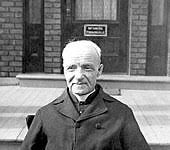In the Old Testament book of Genesis God reveals that He has made us in His image and likeness (Genesis 1:26). That being so, no image of God can be complete if it does not reflect to some degree the image of a human person. While the Person of God as Father was depicted in the Old Testament, the Gospels make very clear through the life and death of Jesus Christ that God truly is to be personified in not just one, but three Persons in one God.
The habit of personifying God is hardly new. Before Christianity the Egyptians personified their gods in Isis and Osiris. The Greeks personified their gods in Zeus, Athena, Apollo and others. Most of these gods reflected, at least to some degree, the worst of human personality traits. But it was precisely because they did not reflect the best elements of humans that they went the way of all flesh into historical irrelevance. Only the God known as perfectly good could outlive all the others.
When I hear the Deists say there might be a Supreme ‘Thing’ but no Supreme Person, I have to ask myself why they do not see evidence of a personal God. I can’t come up with a reason. Just the fact that humans everywhere since the dawn of human history have reached out to God, not just as a Thing, but as a Personal Thing, suggests very strongly that the Supreme Thing who created us also created us to reach out to a Person, not just a Thing. If we remove from us all our need for divine love and truth and mercy and justice, we become as mere stones hurtling through the universe.
Are we to believe that an impersonal Thing unconsciously created us to want a personal relationship with It? That would put us in a position of possessing attributes the Thing itself was powerless to possess. It also puts us in the position of assuming that the Thing created us without wanting to know and love what It had created, whereas humans knew they had been created to know and love the Creator. Why does a mindless impersonal Thing appeal to anybody as an idea of a Supreme Being?
When the people who deny God is a Person think about it, sometimes they will concede that one trait of human personality God might possess (but one trait only) is the trait called Reason. The Deists of the 18th Century – Voltaire for example – allowed this possibility. It is to their credit, I suppose, that being intellectuals they could imagine a power of Reason greater than their own. The existence of this God as Reason was suggested to them by the growing discovery, especially among the astronomers and physicists, that the universe seems to follow a certain set of laws. But how, they wondered, could there be Laws if there is no Lawgiver?
Less than a century ago Albert Einstein, the most prominent scientist of his age, but no believer in a personal God, announced his belief in the God of Reason. As he said: “I believe in Spinoza’s God who reveals himself in the orderly harmony of what exists, not in a God who concerns himself with fates and actions of human beings.”
But this kind of logic seems truly self-defeating. If you are going to assign the one human trait of “reason” to God, why not grant other traits in God such as “love” and “mercy”? When Mozart composed beautifully sacred music by which to celebrate receiving the Eucharist, the hymn Ave Verum Corpus; when Michelangelo painted powerful images of God the Father in the Sistine Chapel; when the magnificent spires of the Medieval cathedrals reached boldly heavenward; when people of every age and every continent have spent themselves searching and finding a reason to know God as a Person, not a Thing; when the same searchers have been consoled and lifted up by the loving embrace of Jesus Christ … we have to wonder why anyone would think that God’s powers are limited to Reason, to the mere act of creating the universe, winding it up with rational and harmonious laws, then abandoning the scene like a petulant child who tosses aside a toy that has lost its novelty. The dreadfully persistent and gnawing question will not go away.
Why is this God of Reason even reasonable to those who worship Reason?










